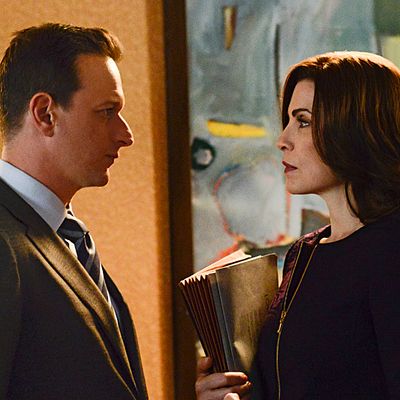
This post is all about last night’s episode of The Good Wife. If you don’t want to know what happened on that episode, stop reading now.
The Good Wife is only barely a lawyer show. What it really is is a sexual tension show, and it uses a legal setting to explore many types of sexual chemistry. Depositions turn into seductions, police harassment might as well be a striptease, and something as banal as an NPR news broadcast becomes the alluring backdrop to passionate oral sex. The show’s most reliable source of complicated, dramatic, interesting, and, yes, sexy sexual tension was the fraught relationship between Alicia Florrick and Will Gardner, one that went far beyond lust and flowery romantic love well into resentment and frustration and sometimes surprise. Every conversation between the two of them seemed like a perfectly plausible time for one of them to crack, to confess their love, to sweep the other into an embrace — but just as often it became a slightly bitter bickering match, a show of who could be the iciest. Will’s murder puts an end to the show’s most important relationship, and it does so in the least interesting possible way.
Josh Charles wanted out, so Will had to go — but all that history is why this wasn’t the death he deserved. Sure, life can be messy and nasty and unfair. But compare Will’s death to another “shocking” death on prime time from a few days ago, namely James Novak (Dan Bucatinsky) on Scandal. That death was part of his character’s arc, the conclusion of a series of dangerous decisions. Not James’s fault, exactly, but definitely a direct result of his own actions. That murder taught us about other characters and reinforced some ideas about the world Scandal operates in. Will’s death on TGW is more like Matthew’s (Dan Stevens) death on Downton Abbey, totally abrupt and unconnected to the rest of the story, not at all part of a broader web of ideas or characterizations. No one’s complicit in it, no one’s responsible for it (other than Weeds’ Hunter Parrish), and it doesn’t advance the story so much as go back to an old one. Matthew’s death on Downton meant Mary had to begin the husband search all over again, and Will’s death sets us back to season-one Alicia, to grief-stricken, victimized Alicia.
The first, oh, three seasons of this show were Alicia suffering and grieving. She was publicly humiliated, financially in a bind, and she was mourning the loss of her marriage (at least, her marriage as she knew it) and previously pristine life. Part of what made her relationship with Will so special is that he was a beacon for her. Will was the guy who hired Alicia at Lockhart Gardner when her life was collapsing; he was a supportive friend, and a seemingly diligent and enthusiastic lover. The Good Wife’s characters generally have a lot of agency — they’re smart and tough, and no one is particularly constrained by righteousness, so there’s often naughty behavior and surprising audacity — and Alicia’s whole story has been about developing her own ferocious sense of agency and possibility, away from her husband Peter and his mother Jackie and her own crazy mom and decent kids. Some of that self-determination she learned by watching Will, but a lot of it she learned through her own interactions with him. He was her Sliding Doors option. (“To our minds, Alicia has one love in her life, and it’s unfortunately not her husband,” TGW’s creators told Vulture this spring.) She could look at him and see a different life for herself, and when she chose Will and then chose Peter, she was really choosing. It wasn’t just circumstance, and she wasn’t just boxed in. She was really making her own decisions. We saw it again with the Florrick Agos secession, this idea that Alicia had become a doer, that people like her and Cary and Diane and Will and Peter and Eli are people who make things happen.
And that’s why Will’s death feels like an abnegation of the show’s ideas: It’s not at all about making things happen. It’s about things just …happening. Will and Alicia are the only two characters who really knew each other inside and out, and now that’s gone. They had a flicker of reconciliation this week, and now we’ll never see that come to fruition. We’ll get to see Alicia grieve and everyone be sad and angry, and Diane and Kalinda will wade through their devastation while Lockhart Gardner falls apart in some kind of leadership vacuum process all over again. I don’t want to watch arbitrary suffering. I want to watch a lawyer show about sex. A sex show about lawyers. I want regular old — smart, unique, hilarious — The Good Wife.




